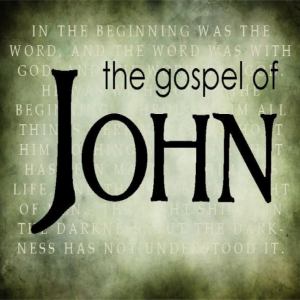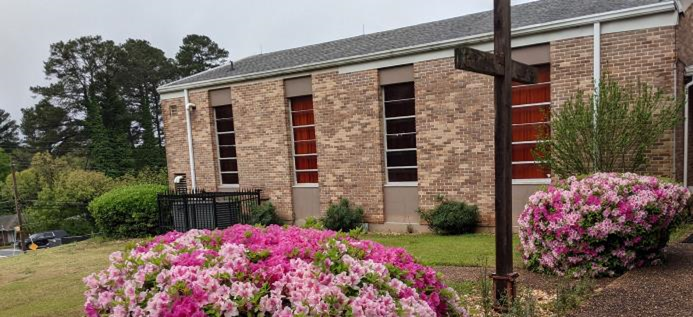Episodes

Tuesday Feb 05, 2019
02-03-19 Kevin Goins - The Desire to Pray
Tuesday Feb 05, 2019
Tuesday Feb 05, 2019
“The Desire to Pray” Matthew 6:5-13
It takes more to pray than simply knowing how to do it. Something else is required and what is required is desire. Do we want to pray? Why should we love to pray? Our text tells us.
I We may swear we l_______ God, but can we really mean it if we have no d_______ to talk to him.
A. How, can it be that we don’t love talking with God? The enemy has taken our v________ and turned everything u________ d_______.
B. Matthew 6:9-13 is a p________, or b_____________, for the kind of prayer which followers of Jesus need to pray. But not only does this passage teach us h_____ to pray, but in this prayer we learn why we should l______ to pray.
II Who are the super-saints who have a n__________ a________ to love prayer? Jesus says it is the h_____________.
A. Hypocrites could not choose the t______ for prayer, but they could decide w______ they would be when those times came.
B. But notice Jesus’ response: he does not say the hypocrites were hypocritical because they prayed in order to receive a r________, he says they are hypocrites because they pray for the ________ reward.
III Here is the first reason why we should be t________ with prayer: Prayer strengthens the most wonderful relationship we can have, a relationship with _____.
A. The reason we often think of prayer as duty, rather than pleasure, is because we look at prayer in the _______ way: We often think of prayer as one long list of r___________ to dump on God.
B. Prayers of request are legitimate prayers, but they are not the o____ kind of prayer and they are not the most i________ kind of prayer.
IV The four steps for relational prayer are:
A. P___________ yourself to God without p___________.
B. A__________ to how you t________ about God.
C. P_________ yourself of anything blocking your relationship with God.
D. A_________ God as the f_______ concern of your life.

Wednesday Jan 23, 2019
01-20-19 Kevin Goins - Ministry in the Middle
Wednesday Jan 23, 2019
Wednesday Jan 23, 2019
“Ministry in the Middle” Luke 11:5-8
There is a kind of ministry in which every follower of Jesus must stand in the middle, and this ministry in the middle is one of the most important ministries in which any believer ever takes part. In Luke chapter 11 Jesus uses a parable to explain this ministry to us.
I This story is about ________ people:
A. First, there is the man/woman in the ___________, and this could easily be ______ or _____.
B. Who are we in the middle of? On one side we have a friend who is on a journey and he comes to our door hoping for r_______ and b_______ for the night.
C. The third person in the parable is the one who stands on the o_______ side of us, our n________ who has the bread we lack.
II This story is about being a middleman/woman in the p________ sense: one who stands between a friend who n_______ bread and another who h____ bread.
A. But a parable uses a common event in the physical world to help us understand what happens in the s__________ world.
B. An i____________ is someone who stands between a person who has a need only God can meet and God himself.
C. Jesus says when you act as an intercessor for a friend in need, and you come knocking on God’s door for help, that door will be ____.
II We have looked at the three individuals in the parable, but what does the man/woman in the middle teach us about being an intercessor?
First, to be an intercessor we must have a f_______ who is willing to c_____ to us for help.
Second, to be an intercessor we need to know the difference
between needs we can ______ and needs only ______ can meet.
C. Third, to be an intercessor we must be convinced prayer makes a _____________.
D. Fourth, to be an intercessor we must be s_____________.
E. Finally, to be an intercessor we must be willing to p_____ the p_______ of being an intercessor.

Tuesday Jan 15, 2019
01-13-19 Kevin Goins - Praying the Lord's Prayer
Tuesday Jan 15, 2019
Tuesday Jan 15, 2019
“Praying the Lord’s Prayer” Matthew 6:9-13
When the disciples asked Jesus to teach them how to pray, he gave them the prayer we know as the Lord’s Prayer. Many people have committed this prayer to memory, but it also works well as a pattern or framework upon which we can build our own daily prayers. Each of the five petitions of the Lord’s Prayer gives us a piece of the structure which we can use to fashion an effective and powerful prayer
I The first part of the prayer structure is what we call w________ or a__________ (6:9).
II The second part of the prayer structure is s__________ or s___________ (6:10).
A. When we pray God’s will to be done in our life, we are surrendering our right to be the o____ who is in c__________.
B. But this request is not just about ____, it is about _____ people everywhere on earth.
III The third part of the prayer structure is p___________ (6:11).
IV The fourth part of the prayer structure is c______________(6:12).
. This petition makes our forgiveness by God depend on our w_____________ to forgive those who have _______ us.
B. This prayer is hard to pray because we so enjoy being _________ at those who wrong us.
V The fifth part of the prayer structure is the prayer for d______________ (6:13).
A. The best way for evil to hurt the progress of God’s Kingdom is to show that the work Jesus did on the cross is i______________.
B. E_______ is behind every sorrow and pain this world experiences, and so looking to Jesus to help us with t___________ will accomplish more than any political party ever could.

Tuesday Jan 08, 2019
01-06-19 Kevin Goins - The Dos and Don'ts of the Lord's Supper
Tuesday Jan 08, 2019
Tuesday Jan 08, 2019
“Do’s and Don’ts of the Lord’s Supper” 1 Corinthians 11:23-32
In 1 Corinthians chapter eleven Paul is dealing with a church who has gotten their celebration of the Lord’s Supper all wrong. His response to them is deeply theological, but it is also very practical. It is his practical instruction that we want to look at today.
I The first Do of the Lord’s Supper is Do t________ o________ what you know about the Lord’s Supper (11:23).
A. The Lord’s Supper began when Jesus gathered with his
disciples to celebrate the Jewish holy day known as _____________.
B. It is easier to remember something when you hold in your hands a t__________, p__________ reminder
II The second Do of the Lord’s Supper is Do c____________ the Lord’s Supper r____________(11:23-24).
III The third Do is a Don’t: Don’t forget h____ m_____ Jesus l________ the church (11:27-29)
A. The Lord’s Supper draws each of us into r_____________ with every other member of the Body of Christ – This is why the Lord’s Supper is also called C______________.
B. What Paul is upset about with the Corinthians is ______ they are celebrating the Lord’s Supper.
C. What Paul is saying is that there is a close and powerful c___________ between the way we t_______ each other in church and whether our celebration of the Lord’s Supper is worthy or unworthy.
IV The fourth Do of the Lord’s Supper is Do e________ y_________.
V The final Do of the Lord’s Supper is Do remember _________.

Wednesday Jan 02, 2019
12-30-18 Bruce Bliss - Balanced Disciple
Wednesday Jan 02, 2019
Wednesday Jan 02, 2019
Up Questions
Do I make enough space for payer?
What situation or what person is weighing on my heart?
Am I noticing God’s strength and power more and more in my life?
Am I living in a state of peace?
Am I afraid or nervous?
Am I obedient to God’s prompting?
In Questions
Do I love the people at FAC (in my community)?
How well do I know their story?
Do I have any FAC relationships outside of Sunday morning?
Am I discipling anyone?
Am I making myself vulnerable to others?
Do I keep my promises?
Out Questions
Do I have a heart for people not living in the story of Jesus?
How often do I share my faith?
Do I leave time for relationships with non-Christians?
Am I proud of the gospel or ashamed?
Am I a servant?
Do I intentionally spend time with the poor?
Am I generous with my finances to those who don’t have enough?

Friday Dec 28, 2018
12-23-18 Kevin Goins - Angels We Have Heard on High
Friday Dec 28, 2018
Friday Dec 28, 2018
“Angels We Have Heard on High” Luke 1:26-38
Most of the characters of Christmas give something to the Christ child at his birth. The angels give their “Glorias,” which is what our carol today highlights, the shepherds give their worship, and the wise men give gold, frankincense, and myrrh. Mary, however, is one of the few who gave gifts, not to the baby, but to God the Father. What did Mary give God for Christmas?
I The first thing Mary gave to God was her____________ (126-27).
A. In that day engagement was very different – it was not p__________ for marriage, it was p________ of marriage.
B. Gabriel tells Mary that God wants her to give birth to a child who will ____ be the offspring of her husband Joseph.
C. At this point, Mary had no reason to believe she would not be ___________ by Joseph.
II The second thing Mary gave to God was her ________ (1:28-35).
A. It’s frightening enough for a young girl to think of having a baby, but this birth would be u________ any other birth e______.
B. The Old Testament said that no one can see God and l_______ – So, how could Mary give birth to the ______ of God and live?
III The third thing Mary gave to God was her t__________ (1:36-38).
IV What are you willing to give God for Christmas?
A. Maybe we need to give God our ____________.
B. Maybe we need to give God our ____________.
C. Maybe we need to give God our ____________.

Wednesday Dec 19, 2018

Tuesday Dec 11, 2018
12-09-2018 Kevin Goins - Go Tell It On The Mountain
Tuesday Dec 11, 2018
Tuesday Dec 11, 2018
“Go, Tell It on the Mountain” Luke 2:8-20
Go, Tell It on the Mountain is one of the spirituals which African slaves in the United States sang to celebrate the birth of Jesus. If people enslaved on plantations found the desire to lift up their voices and enthusiastically proclaim the birth of the Savior, it should be even easier for us to do so. But it is not easy. What can we learn from the shepherd’s story which will encourage us to proclaim the good news of the birth of the Savior?
I First, the Shepherds teach us that it helps if you don’t have a degree in ________ or ___________ (2:8-9).
Why would God choose to reveal the birth of his Son first to
Shepherds instead of the priests and religious leaders?
1. The Savior who was born was n____ a__ a_____ what the
religious leaders were looking for.
2. God wants people to trust _____, not all the religious e_________ they have, not all the religious a__________ they carry out.
B. People who can talk about Jesus in their own w______, without religious w______ - they have a real advantage.
II Second, the shepherds teach us that if you want to talk to people about Jesus, it helps to be t___________ (2:9-14).
A. The message of the angels is like the ministry of the Holy Spirit:
1. The angels c_______ the Shepherds.
2. The angels bring g______ n______ to the Shepherds.
3. The angels specifically tell the Shepherds about the birth of a Savior who is “______ the ______.”
B. The ministry of the angels to the Shepherds is a p_________ of the ministry of the Holy Spirit.
III Third, the Shepherds teach us that if you want to talk to people about Jesus it helps to spend time with the h______ f_______(2:15-16).
IV Finally, the Shepherds teach us that if you want to talk to people about Jesus, it helps to be a g___________ (2:17-20).

Tuesday Dec 04, 2018
12-02-2018 Kevin Goins - O Come O Come Emmanuel
Tuesday Dec 04, 2018
Tuesday Dec 04, 2018
“O Come, O Come, Emmanuel” Isaiah 11:1-9
O Come, O Come, Emmanuel is one of the only Advent carols we Evangelical Christians ever sing. What is the difference between an Advent carol and a Christmas carol? Christmas carols look back with joy and celebration at how the Messiah has come to this world. Advent carols look ahead with longing and pleading for the Messiah to come to this earth again. If we want to look ahead, as the early church did, and observe Advent before we celebrate Christmas, how do we do it. Isaiah tells us what we must do:
I First, we must celebrate Advent with a______________ (11:1-3).
A. Sprinkled in with Isaiah’s prophecies of judgment on Israel, there are flashes of h_______ when he describes the coming of a _____________.
B. Isaiah describes how the Spirit of God will e________ the Messiah:
1. First, he will be given the Spirit of w________ and u_______________.
2. Second, he will be given the Spirit of c__________ and of p_________.
3. Third, he will be given the Spirit of k___________ and of the f________ of the Lord.
II Second, we must celebrate Advent by l________ to the f_________ (11:4-5).
A. In the middle of verse four there is a c__________ which spans c____________.
B. The Old Testament prophets often spoke of Messiah as if his s_________ work and his work of j_____________ take place at the same time.
C. Advent is about ____ comings of Messiah, __________ ___:__-__ is about two comings of Messiah, and, if you look at O Come, O Come, Emmanuel, you can see that it too is about two comings.
III Third, we must celebrate Advent with a_____________ (11:6-9).
A. What makes us think these words are anything more than just a f__________?
1. This is not the ____ prophecy Isaiah spoke about the Messiah.
2. Part of Isaiah 11 has a________ b________ fulfilled.
B. We need to celebrate Advent with anticipation because Jesus is going to return and establish a Kingdom of ___________.

Tuesday Nov 27, 2018
11-25-2018 Kevin Goins - I Love A Mystery
Tuesday Nov 27, 2018
Tuesday Nov 27, 2018
“I Love a Mystery” (conclusion) John 7:53-8:12
Someone has said, “We all love a good mystery.” If that’s true, then we should really enjoy the passage we’re looking at today because it is loaded with mysteries.
I The first mystery is the mystery of the misplaced story.
II The second mystery is the mystery of iniquity.
III The third mystery is the mystery of the m___________ a___________ (8:3-6a).
A. The fact that only h______ of the wrongdoers were brought to justice tells us that something s____________ is taking place.
B. Putting Jesus into what they thought was a “No-_____” situation was their ______ reason for accusing this woman.
IV The fourth mystery is the mystery of the w______ in the s_________ (8:6b-9a).
A. It’s not w______ Jesus wrote in the dust that is important – For two reasons:
1. If what he wrote was important, we would have been t_______ what it was.
2. When John says (8:9) that the accusers went away, he says it was because of what they h_______ from Jesus, not because of what they s____ written in the dirt.
B. In response to their question, Jesus i________ the Pharisees, showing them that he doesn’t take their show of righteousness s____________.
V The fifth mystery is the mystery of the Holy Spirit’s power to c___________ us with our sin (8:9).
A. When these men first dragged in the girl, they felt no g_______ at all.
B. Jesus said sentence against the woman must be carried out only by those who are not guilty of the s_______ s_____.
VI The sixth mystery is the mystery of the g________ of the Lord Jesus Christ (8:9-11).
A. The one who had every right to c_________ her, chose not to,
because his mission was not to condemn, but to s_______.
B. When Jesus said, “I do not condemn you,” he knew what those words would cost him - they would cost him the ________.

